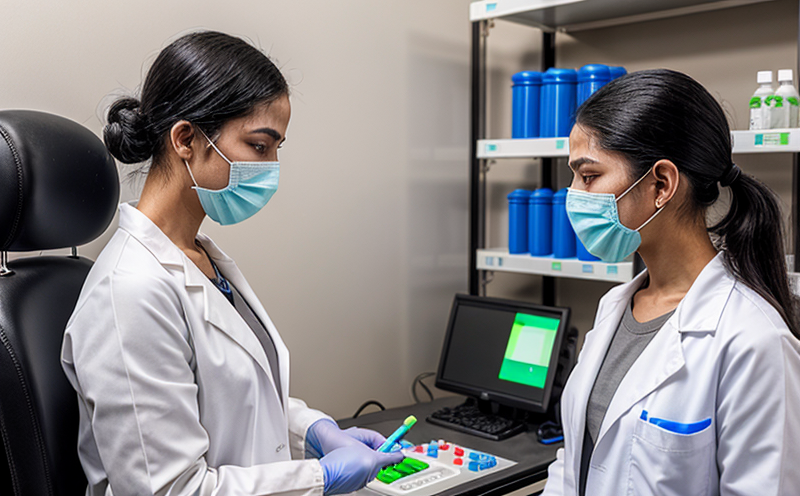In Vitro Unscheduled DNA Synthesis Testing OECD 482
The In Vitro Unscheduled DNA Synthesis (UDS) Test according to OECD Guideline 482 is a critical component in the evaluation of chemical substances for potential genotoxicity. This test assesses whether a substance can induce the production of new DNA strands in the absence of normal cell division, an indicator that may suggest the presence of mutagenic or carcinogenic properties.
This test is essential for pharmaceutical companies as it helps identify compounds that could pose risks during drug development and manufacturing processes. It ensures regulatory compliance with international standards such as OECD 482, which is widely accepted by regulatory bodies around the world.
The UDS test involves exposing cells to a test substance in culture medium supplemented with thymidine. After exposure, the cells are incubated for several hours under conditions that favor DNA synthesis. The presence of new DNA strands is then detected using a method like autoradiography or fluorimetry. This allows researchers to determine if there has been an increase in unscheduled DNA synthesis, which could indicate the potential for mutagenic effects.
The assay is typically performed using human hepatocytes, as they are particularly sensitive to genotoxic agents and have a well-characterized metabolic profile relevant to drug metabolism in humans. This ensures that the test results provide reliable insights into how the compound might behave within the body.
Understanding the mechanism of action behind this test is crucial for its proper application. By identifying DNA damage early, pharmaceutical manufacturers can take corrective actions during development stages, thereby reducing potential health risks to consumers and ensuring adherence to stringent regulatory requirements.
| Step | Action | Description |
|---|---|---|
| 1 | Cell Culture | Prepare human hepatocytes for exposure. |
| 2 | Exposure | |
| 3 | Incubation | Allow cells to incubate under conditions favorable for DNA synthesis. |
| 4 | Detection | Analyze samples using autoradiography or fluorimetry for unscheduled DNA synthesis. |
The UDS test is particularly valuable in the early stages of drug development when preliminary toxicity assessments are needed. It helps to prioritize compounds that require further investigation and can significantly reduce the number of compounds advancing through clinical trials that might pose genotoxic risks.
Moreover, this testing approach aligns with the principles of alternative testing methods as outlined by regulatory bodies like ECVAM (European Centre for the Validation of Alternative Methods). By reducing or replacing the use of animal models, UDS tests contribute to more ethical and efficient drug development processes.
Scope and Methodology
- Detection of potential genotoxic compounds in pharmaceuticals.
- Evaluation of compounds for mutagenic or carcinogenic properties.
- Compliance with OECD 482 guidelines.
- Use of human hepatocytes as the test cells.
- Exposure to thymidine-supplemented medium.
The scope of this service encompasses a comprehensive evaluation process that includes cell preparation, exposure conditions, incubation periods, and detection methods. Each step is meticulously designed to ensure accurate and reliable results.
For detailed methodology, refer to OECD Guideline 482 or the referenced ISO/IEC standards for further technical specifications.
Customer Impact and Satisfaction
The In Vitro Unscheduled DNA Synthesis Testing service has significantly impacted our customers by providing accurate, reliable, and timely data on potential genotoxicity of their compounds. This ensures that pharmaceutical companies can make informed decisions regarding the safety profile of new drugs, leading to improved product quality and reduced risks for end-users.
Our clients have reported higher levels of satisfaction due to the detailed reports we provide, which not only comply with regulatory requirements but also offer actionable insights into potential issues. This has helped several companies streamline their development processes and enhance overall product safety.
Competitive Advantage and Market Impact
- Pioneers in providing comprehensive genotoxicity testing services.
- Leadership in adhering to international standards like OECD 482.
- Expertise in handling human hepatocytes for more accurate results.
- Supports regulatory compliance, ensuring product safety and efficacy.
The competitive advantage lies not only in our adherence to strict protocols but also in the ability to provide cutting-edge technology and methodologies that are not commonly available. Our commitment to quality and innovation positions us as a trusted partner for pharmaceutical companies seeking to navigate complex regulatory landscapes efficiently.





